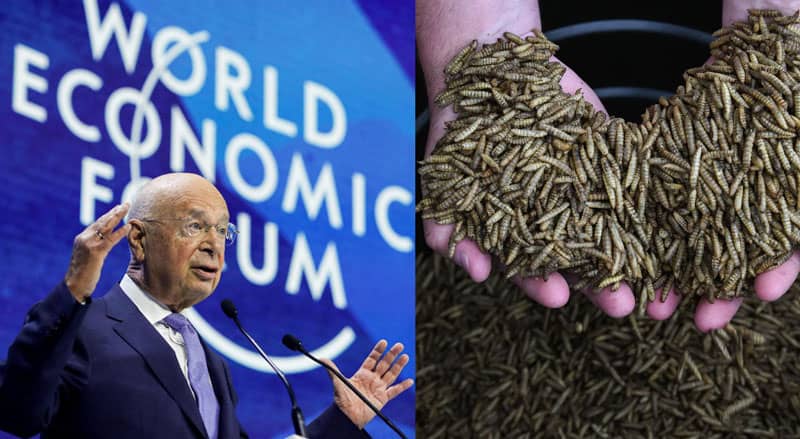A group of researchers has backed calls from the World Economic Forum (WEF) to push for the mass public consumption of bugs and so-called “beetleburgers,” arguing that it could save the planet.
According to a study, conducted by French biotech company Ynsect, food made from mealworms and insect larvae could help fight “climate change” and feed the world if it is put into mass production and replaces meat.
Ynsect insists that the process of creating “meat” from creepy crawlers’ larvae uses a fraction of the land and water and emits a smaller carbon footprint in comparison to traditional farming.
“Mixed with sugar, the beetles supposedly taste just like real meat,” the researchers claim.
“They could also become alternatives to sausages or chicken nuggets.”
Conveniently, Ynsect plans to make the mass public consumption of bugs a reality and is currently developing a global network of insect farms, including nurseries and slaughterhouses.
A pilot plant has already been set up in France, the company revealed.
“We are in full control of the chain of production,” says Ynsect general manager Benjamin Armenjon, according to a statement from SWNS.
“That gives us strength in terms of quality, security, and safety.”
In the “meat” production facility, robot arms and automated conveyor belts transport stacks of red trays in every direction, according to Study Finds.
They are filled with billions of Tenebrio Molitor beetle larvae.
According to Ynsect, the dried bugs are more than 50 percent protein and rich in fiber and fats as well.
They can be turned into protein powders, shakes, burgers, cereal bars, and even cooking oils at a fraction of the environmental cost of traditional farming, the company claims.
Study Finds notes:
For every kilogram of protein, Ynsect uses 98 percent less land and emits 40 times less carbon than beef.
It also uses 40 times less water than pork production.
The idea of the public masses being fed bugs has been promoted by global elites for some time.
Last year, the World Economic Forum promoted the European Union’s new plan to use mealworms in food.
According to the WEF, reducing meat consumption by feeding bugs to the public will help fight “climate change.”
“Livestock around the world is responsible for around 14.5% of all greenhouse gas emissions relating to human activity,” the EU’s paper says.
“The need for land – whether for grazing animals or growing crops to feed animals – is the single greatest driver of deforestation, with major consequences for biodiversity loss.”
As Slay News reported last year, the WEF’s top advisor has called for the public to switch to eating laboratory-grown “synthetic meat” in an effort to fight “climate change.”
The WEF’s Yuval Noah Harari, who describes himself as a “futurist,” made a push for “cultured meat” products that are synthesized in laboratories during remarks at the International Institute of Management in Kyiv, Ukraine.
Harari argues that the public must start consuming synthetic foods because they are more “ecological” and “ethical” than meat from animal husbandry and slaughter, which he claims is “unsustainable.”
Harari was promoting the plan for switching to “cultured meat” which is being pushed by the WEF.
The WEF, founded and chaired by German economist Klaus Schwab, describes “cultured meat” as a “sustainable” substitute for human consumption of animals.
The organization claims that the world’s population must stop eating meat in order to “save the planet” from “carbon emissions.”
In its argument for the public eating “synthetic meat,” the WEF explains how the food products are grown in the lab:
The process of growing meat in a laboratory involves taking stem cells from a live animal and growing them in nutrient-rich conditions.
For example, a small biopsy of skeletal muscle is taken from a cow, from which the stem cells are isolated and grown in a bioreactor with cell culture media.
The cells are split into several cell types including muscle and fat cells.
This biomass is then processed to form the edible final product.
Harari framed human consumption of animals as unsustainable.
“We can find ways to provide what people need in more ecological and sustainable ways,” he said.
“This is the best course forward.”
As Slay News previously reported, Harari declared in a separate interview that “we just don’t need the vast majority of the population” in today’s world.
According to Harari, most of the general public has now become “redundant” and will be of little use to the global elite in the future.
READ MORE – WEF Advisor: ‘We Don’t Need Vast Majority of Population’

Our comment section is restricted to members of the Slay News community only.
To join, create a free account HERE.
If you are already a member, log in HERE.
Recommended